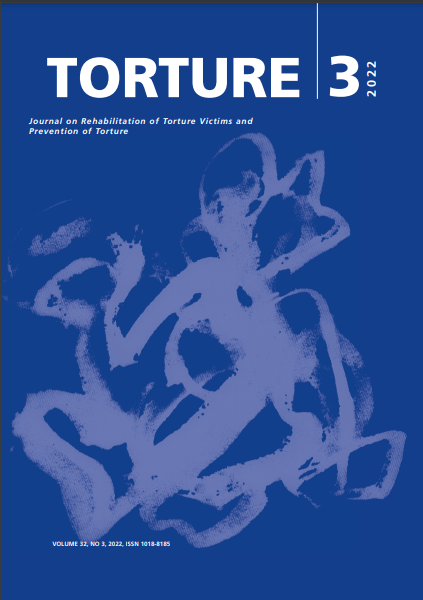Vol. 32 No. 3 (2022): Torture Journal: Journal on Rehabilitation of Torture Victims and Prevention of Torture

This issue introduces the revised edition of the Istanbul Protocol. The Editorial offers a summarised guide that outlines the new elements and main variations of the recently launched 2022-version. You will find it available in English, French and Spanish.
The contribution from Ergun Cakal opens the scientific section of this issue, presenting a doctrinal review which consolidates normative understandings of adequate prisoner food. His paper discusses the aspects relevant to assessing when and how food provision is considered inadequate through a systematic exploration of international and regional standards.
Phyu Pannu et al. continue exploring resilience-promoting factors for refugees who have survived torture to understand how these impact the relationship between torture and mental health.
Aaron Gallagher et al. present a student-run clinical study to investigate the changes in asylum seekers’ profile over 3 years. They argue that understanding background and trauma profile of newly displaced populations is fundamental to meet their health needs and integration.
The section Perspectives compiles two papers. In the first one, Daniel J. N. Weishut discusses the potential participation of psychologists in IP-based physical examinations as it elaborates on the author’s perspective as clinical psychologist and relevant literature. In the second one, Maria Hartwig and Mark Fallon argue that the American government’s post 9-11 torture program was a big deceit, in that the designers, executors and enablers knew all along that torture does not elicit reliable information. The authors review the government’s own research and discuss the ways in which methods known to be unreliable were implemented, most saliently at the detention facility at Guantánamo Bay, against international law and human rights.
The Continuous education section includes a case where Cynthia Luo et al. argue the limitations of administering psychological surveys implying the development of ways to identify, mitigate and overcome such limitations.
In our News section, we celebrate the launch of the 2022-revised version of the Istanbul Protocol.
Finally, this issue includes the forthcoming call for papers for two special sections on survivors engagement and livelihoods in rehabilitation, in which we encourage you all to submit papers, in case you have relevant research and/or experiences to share in these areas.

